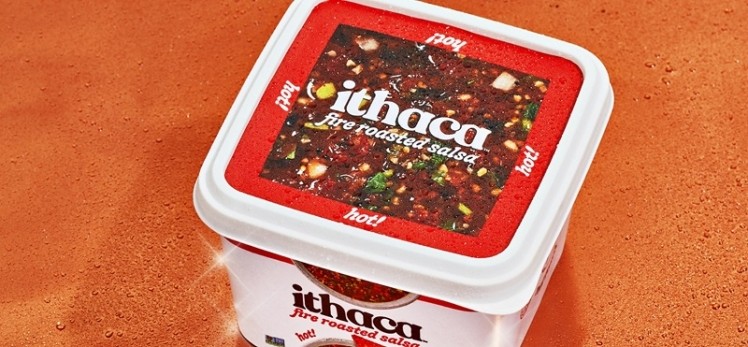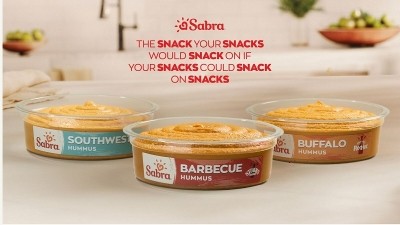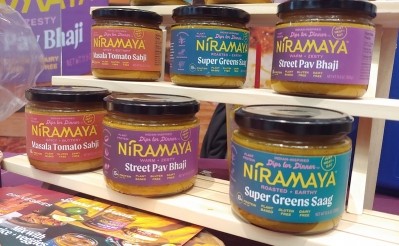Ithaca Hummus’ expansion into salsa underscores retailers' need to rebalance private label sales with premium offerings

“Every retailer is focused on their private label program right now, but that can be a double-edged sword, specifically for the retailer,” because while lower-priced store brands can boost foot traffic and reinforce consumer loyalty, they also reduce the overall dollar spend, Chris Kirby, chef, CEO and founder of Ithaca Hummus, told FoodNavigator-USA.
He explained, “There are so many categories where consumers are trading down to private label at a faster and faster rate every year, and if retailers aren’t doing something to offset that, then the dollars kind of evaporate from each category, and that is not good for them” or the broader CPG universe because it reduces opportunities for brands at different price points and quality levels.
“But,” he added, “if there is truly a meaningful point of difference, many consumers are willing to pay a premium for high-end national brands” they know and trust, like Ithaca Hummus, which can help offset losses from less expensive items in the category.
This is the scenario that prompted Ithaca Hummus recently to branch into the adjacent fresh salsa segment after ten years of focusing only on its line of boldly flavored, fresh hummus.
“One of our retail partners came to us almost a year and a half ago and said that they had a really strong private label program in refrigerated salsa, but they were looking for a national premium brand product to help with that offset. … And as experts in fresh ingredients and cold processing and HPP, we knew that we could win on taste and texture in the refrigerated salsa category. So, it made sense for our brand and it made sense for the retailer, and it strengthened our partnership,” Kirby said.
After tinkering with combinations of fresh ingredients, Ithaca Hummus launched earlier this year a trio of Mild, Medium and Hot! Fire roasted salsa that combine smokiness, freshness and varying levels of “kick” from premium peppers.
Private label + premium offers win-win
Ithaca Hummus’ expansion in to premium salsa offers a win-win for the brand and retailers not just because it balances out category sales, but because it creates a better branding opportunity for both and appeals to premium shoppers, Kirby said.
He explained Ithaca Hummus’ HPP processed, fresh salsas easily slide into a white space that often attracts regional players, but which still does not have a dominate national brand – allowing Ithaca to leverage its scale and brand awareness to attract shoppers who are willing to spend more on products from a name they recognize and trust but without having to compete on price with the heavy-hitting brands that play in shelf stable salsa.
In this way, the brand strikes a balance between premium pricing retailers want and offering a “splurge” product for consumers that is still attainable even as they look to stretch their dollars elsewhere, Kirby said.
The expansion also allowed Ithaca to tap into a faster growing category than hummus, which Kirby noted “is a nice change of pace for us.”
He explained that the refrigerated salsa segment is worth about $700m in total annual sales and growing double-digits year-over-year as it sources new customers from the center of the store.
Hummus, on the other hand is flat, even though Ithaca Hummus is growing as a brand, Kirby said.
He explained that because refrigerated salsa isn’t as competitive as hummus, retailers are more open to adding products without removing others to make space.
And because refrigerated hummus and fresh salsa often are sold side by side, Ithaca Hummus can create a bigger brand block, helping to boost its visibility to consumers who may not buy hummus but who purchase other dip.
For retailers, Ithaca Hummus’ fresh salsa appeals to a shopper who routinely purchases more expensive offerings.
“We’ve got great basket data that shows the Ithaca Hummus shopper is also buying the grass fed beef, the free range, grade A eggs and the premium Grillo’s Pickles and Mary’s Gone Crackers. … That is absolutely a big part of our story because overall, retailers are absolutely trying to attract that premium shopper,” Kirby explained.
Next steps: From rebranding to maximizing capabilities
Expanding into a new category isn’t seamless, however, and Kirby acknowledges it brings new challenges, such as branding.
He explained that having ‘hummus’ in the company name “is something that eventually we’re going to have to address" as the company moves beyon its flagship line.
"As a brand owner, it is one of those things that drives me crazy, but consumers … don’t necessarily need to have a linear story that is perfect on day one. So, while we wish would could have been more prepared with our brand messaging and our URL and our brand name and trademark, we didn’t want to let this opportunity pass us by.’
This challenge is more than offset by synergies that allow Ithaca Hummus to enter salsa with confidence, Kirby added.
He explained the company’s facility is ideal for creating salsa and it won’t need additional equipment, and it’s copacker had a line of tomatoes for other products it makes, which simplifies Ithaca Hummus’ supply chain. And finally, both products can use the same packaging – just different sizes – further simplifying the company’s sourcing.
Looking forward, Kirby sees tremendous potential more broadly for dips, which haven been growing following the pandemic as consumers begin to entertain again and look for easy at-home meal solutions.















